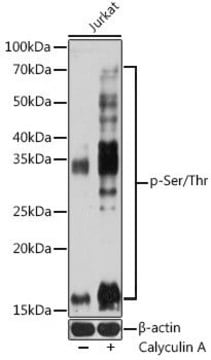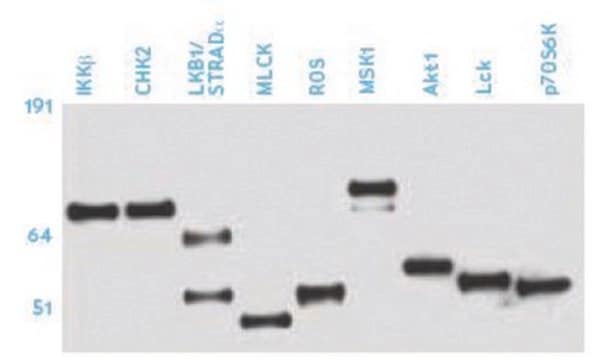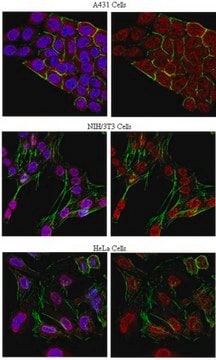05-1000X
Anti-Phosphoserine Antibody, clone 4A4
clone 4A4, Upstate®, from mouse
About This Item
Productos recomendados
biological source
mouse
Quality Level
antibody form
purified antibody
antibody product type
primary antibodies
clone
4A4, monoclonal
species reactivity
vertebrates
manufacturer/tradename
Upstate®
technique(s)
ELISA: suitable
flow cytometry: suitable
immunofluorescence: suitable
immunohistochemistry: suitable (paraffin)
western blot: suitable
isotype
IgG1
shipped in
wet ice
target post-translational modification
phosphorylation (pSer)
General description
Specificity
Immunogen
Application
Signaling
General Post-translation Modification
Quality
Target description
Physical form
Storage and Stability
For maximum recovery of the product, centrifuge the original vial prior to removing the cap. If the product has accidentally been frozen and thawed, spin it at 13,000 x g for 10 minutes at 2-8°C.
Legal Information
Disclaimer
¿No encuentra el producto adecuado?
Pruebe nuestro Herramienta de selección de productos.
Storage Class
10 - Combustible liquids
wgk_germany
WGK 2
Certificados de análisis (COA)
Busque Certificados de análisis (COA) introduciendo el número de lote del producto. Los números de lote se encuentran en la etiqueta del producto después de las palabras «Lot» o «Batch»
¿Ya tiene este producto?
Encuentre la documentación para los productos que ha comprado recientemente en la Biblioteca de documentos.
Nuestro equipo de científicos tiene experiencia en todas las áreas de investigación: Ciencias de la vida, Ciencia de los materiales, Síntesis química, Cromatografía, Analítica y muchas otras.
Póngase en contacto con el Servicio técnico








